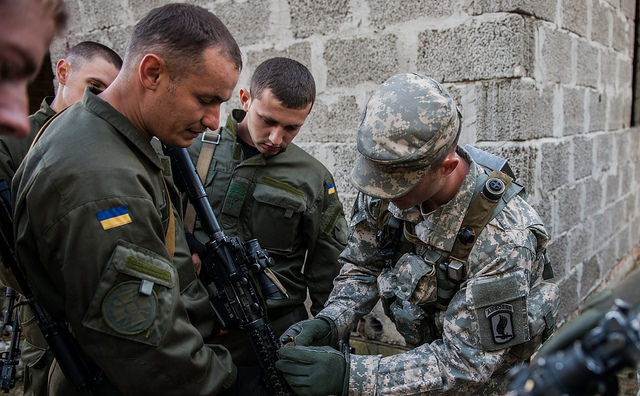
‘Freedom Support Act’ Authorizes, But Does Not Require, Arms Sales to Ukraine
In passing its bill to boost US support for Ukraine last week, Congress left President Barack Obama largely free to decide how and when to apply its provisions – and that flexibility is one reason Obama has chosen to sign the act, even though it includes measures he has resisted, Atlantic Council analysts say.
The Ukraine Freedom Support Act authorizes $510 million in US funding for Ukraine over three years, including $160 million for military aid, and $350 million in civil assistance. The non-military aid is targeted at several goals, including: help for refugees uprooted by the war with Russia; help for Ukraine to overcome energy shortages; strengthening of “democratic civil society”; and steps to “counter corruption and improve transparency” in Ukrainian government agencies.
The White House was non-committal about signing the bill before today. In announcing Obama’s decision, press secretary Josh Earnest said the president still had reservations, partly because its provision for new sanctions against Russia “does not reflect the consultations” with US allies in Europe.
“The bill as passed contains language on mandated sanctions that the administration fears will limit its flexibility in dealing with Moscow and persuading Europe to follow with its own measures,” Herbst noted in an e-mail from Kyiv. But Herbst, who directs the Atlantic Council’s Eurasia program, and Karatnycky, a Council senior fellow specializing on Ukraine, say several factors weighed in favor of the president signing the bill:
- The vote in Congress was overwhelming, which suggests that a veto by Obama would be overridden.
- The Congress that takes office in January “will have a greater Republican presence, so any re-do of the legislation may well be less acceptable to the president,” Herbst noted.
- During the drafting of the current bill, the White House reportedly was in contact with the Congress and won at least some concessions to make the legislation more acceptable to Obama.
“The bill’s passage was a good thing for Ukraine and American foreign policy,” Herbst wrote from Kyiv, where he and Karatnycky have been meeting officials of the newly installed Ukrainian government. “It is important now for the president to sign it and to then implement it, including especially the provision of defensive weapons to Ukraine, which would help deter further Kremlin aggression here.”
Russia has criticized the bill. Foreign Ministry spokesman Alexander Lukashevich said Congress was “showing great zeal in destroying the framework of cooperation” between Russia and the United States. “It’s about time the US congressmen abandon illusions about the effectiveness of their sanctions campaign against Russia,” he said.
Weapons and military support
The bill authorizes (and by doing so explicitly it pressures) the president to respond to Ukraine’s request for weapons. Ukrainian President Petro Poroshenko made that appeal directly in a speech to a joint session of Congress in September. The bill authorizes Obama to provide Ukraine with anti-tank weapons, small surveillance drones, radar systems that can target artillery batteries, and high-security communications systems.
The bill gives Obama sixty days after signing to send Congress “a report detailing the anticipated defense articles, defense services, and training to be provided.”
Former NATO commander James Stavridis urged the administration to Washington to make its military help to Ukraine broad. “I think we should provide significant military assistance” to Ukraine, including “ammunition, fuel, logistics,” he told The Guardian. “I think cyber-assistance would be very significant and helpful, as well as advice and potentially advisers.”
Canada announced last week that an initial team of its soldiers had arrived in Ukraine to determine what training assistance Canada can provide. The Canadian mission aims “to strengthen the capacity of the Ukrainian government to defend its borders and people,” Defense Minister Rob Nicholson said.
Sanctions Against Russia
The congressional bill includes some new sanctions against Russia, which Obama has resisted. The administration has been careful to impose sanctions on Russia only in coordination with European allies, and Obama said last week that the US should not “get out ahead of Europe further” on sanctions.
The bill would require specific US sanctions against Russia’s arms export agency, Rosoboronexport, and on the state-owned natural gas company Gazprom, if Russia cuts off gas supplies to European countries, as it has done in past crises.
The bill was amended just before its final passage to drop a provision that would have designated Ukraine (along with Moldova and Georgia) a “major non-NATO ally.” That status facilitates US weapons sales and military assistance to designated countries. The omission of this provision “is unfortunate, but it ensured the passage of the bill with overwhelming support,” said Herbst, a former US ambassador to Ukraine who now directs the Atlantic Council’s Dinu Patriciu Eurasia Center.
James Rupert is an editor at the Atlantic Council.
Image: US Army Sgt. Richard Lacombe, right, shows Ukrainian National Guard troops the operation of a US M4 rifle during a joint training exercist in Yaroviv, western Ukraine, in September. The bill passed by Congress this month would authorize more training, plus weapons sales to Ukraine. (US Army/Spc. Joshua Leonard)
